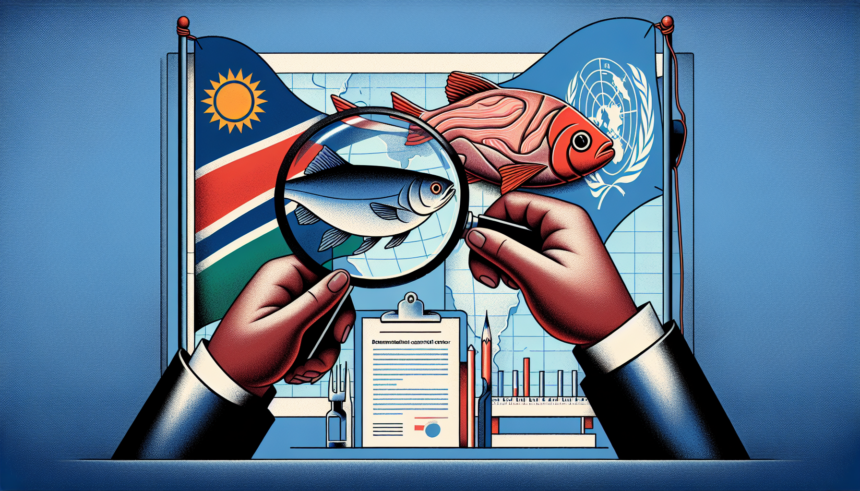Main Points In Hindi (मुख्य बातें – हिंदी में)
-
नई परियोजना की शुरुआत: नामीबिया ने खाद्य सुरक्षा में सुधार और उपभोक्ताओं की सुरक्षा के लिए मत्स्य उत्पादों और डिब्बाबंद मांस के आयात नियंत्रण को मजबूत करने के लिए एक नई परियोजना शुरू की है, जो खाद्य और कृषि संगठन (एफएओ) द्वारा समर्थित है।
-
सामान्य निरीक्षण प्रणाली का विकास: इस परियोजना का उद्देश्य ट्रेसबिलिटी और नियामक अनुपालन में मौजूदा अंतराल को भरने के लिए एक सशक्त निरीक्षण प्रणाली स्थापित करना है, जिससे आयातित मछली और डिब्बाबंद मांस उत्पादों की सुरक्षा और गुणवत्ता सुनिश्चित की जा सके।
-
राष्ट्रीय गुणवत्ता नीति का समर्थन: यह पहल नामीबिया की संशोधित राष्ट्रीय गुणवत्ता नीति (एनक्यूपी) 2020-2025 के अनुरूप है, जिसका लक्ष्य बाजार पहुंच में सुधार और अंतरराष्ट्रीय मानकों के अनुरूप उद्योग के विकास को समर्थन प्रदान करना है।
-
सतत विकास लक्ष्यों का योगदान: एनएसआई और एफएओ के सहयोग से यह परियोजना शून्य भूख, अच्छा स्वास्थ्य और कल्याण, तथा उद्योग और नवाचार से संबंधित कई सतत विकास लक्ष्यों (एसडीजी) की उपलब्धि में योगदान करने की उम्मीद है।
- समावेशिता और क्षमता निर्माण: परियोजना कार्यान्वयन के दौरान क्षमता निर्माण और लैंगिक समानता सुनिश्चित करने पर भी ध्यान केंद्रित करेगी, जिसमें विभिन्न हितधारकों के लिए समावेशी प्रशिक्षण और कार्यशालाओं की योजना शामिल है।
Main Points In English(मुख्य बातें – अंग्रेज़ी में)
Here are the main points from the provided text:
-
Strengthened Import Controls: Namibia has initiated a project aimed at enhancing food security and consumer protection by strengthening import controls on fish products and canned meat.
-
Robust Inspection System: Supported by the Food and Agriculture Organization (FAO), the initiative aims to address gaps in traceability and regulatory compliance by establishing a more robust inspection system to ensure the safety and quality of imported food products.
-
Focus on Risk-Based Inspections: The project will develop a risk-based import inspection system to fill deficiencies in the existing regulatory framework, ensuring that imported fish and canned meat meet safety and quality standards.
-
Alignment with National Quality Policy: This initiative aligns with Namibia’s revised National Quality Policy (NQP) 2020-2025, which focuses on improving market access and strengthening the national quality infrastructure to support industry development according to international standards.
- Capacity Building and Sustainable Development Goals (SDGs): The project will emphasize capacity building, gender equality, and stakeholder inclusion through training and workshops, contributing to the achievement of several Sustainable Development Goals, such as zero hunger, good health and well-being, and industry innovation.


Complete News In Hindi(पूरी खबर – हिंदी में)
हर्ट्टा-मारिया अमुतेंजा
खाद्य सुरक्षा में सुधार और उपभोक्ताओं की सुरक्षा के लिए, नामीबिया ने मत्स्य उत्पादों और डिब्बाबंद मांस के आयात नियंत्रण को मजबूत करने के लिए एक नई परियोजना शुरू की है।
खाद्य और कृषि संगठन (एफएओ) द्वारा समर्थित पहल, ट्रेसबिलिटी और नियामक अनुपालन में मौजूदा अंतराल को संबोधित करने के लिए एक अधिक मजबूत निरीक्षण प्रणाली स्थापित करेगी।
नामीबियाई मानक संस्थान (एनएसआई) के मुख्य कार्यकारी अधिकारी, ईनो मवुला ने 19 नवंबर को एनएसआई परीक्षण और निरीक्षण केंद्र में उद्घाटन के दौरान परियोजना के महत्व को समझाया।
मवुला ने कहा, “यह परियोजना खाद्य सुरक्षा बढ़ाने, कृषि उत्पादकता में सुधार और सार्वजनिक स्वास्थ्य की सुरक्षा में एक महत्वपूर्ण कदम है।”
उन्होंने कहा कि यह पहल मौजूदा नियामक ढांचे में कमियों को भरने के लिए जोखिम-आधारित आयात निरीक्षण प्रणाली विकसित करने पर ध्यान केंद्रित करेगी, जो आयातित मछली और डिब्बाबंद मांस उत्पादों की सुरक्षा और गुणवत्ता सुनिश्चित करने के लिए पर्याप्त नहीं है।
मवुला ने बताया कि परियोजना इस उद्देश्य को आगे बढ़ाएगी, एनएसआई इसके कार्यान्वयन की देखरेख में महत्वपूर्ण भूमिका निभाएगा।
परीक्षण और निरीक्षण के लिए एनएसआई महाप्रबंधक, पालोमा एलिट्सन ने एफएओ के साथ इस सहयोग के महत्व को स्वीकार किया।
“हम इस परियोजना को साकार करने में एफएओ के समर्थन के लिए बेहद आभारी हैं। यह साझेदारी नामीबिया के लिए एक नए अध्याय की शुरुआत का प्रतीक है क्योंकि हम खाद्य मानकों में उत्कृष्टता की अपनी खोज जारी रखते हैं, ”एलिट्सन ने कहा।
परियोजना का उद्देश्य वर्तमान आयात निरीक्षण प्रणालियों का आकलन करना और यह सुनिश्चित करने के लिए एक रूपरेखा विकसित करना है कि आयातित सामान नामीबिया के गुणवत्ता मानकों को पूरा करते हैं।
नई आयात नियंत्रण प्रणाली सुरक्षा नियमों का अनुपालन सुनिश्चित करेगी, उपभोक्ताओं को घटिया उत्पादों से बचाएगी और निष्पक्ष व्यापार प्रथाओं को बढ़ावा देगी।
यह परियोजना नामीबिया की संशोधित राष्ट्रीय गुणवत्ता नीति (एनक्यूपी) 2020-2025 के अनुरूप है, जिसे अप्रैल 2021 में एमवुला द्वारा लॉन्च किया गया था।
यह नीति बाजार पहुंच में सुधार और अंतरराष्ट्रीय मानकों के अनुरूप उद्योग के विकास का समर्थन करने के लिए देश की राष्ट्रीय गुणवत्ता बुनियादी ढांचे (एनक्यूआई) को मजबूत करने पर केंद्रित है।
एफएओ देश की प्रतिनिधि क्विंगयुन डियाओ ने इस पहल के लिए अपने संगठन का समर्थन व्यक्त किया।
“एफएओ तीन दशकों से अधिक समय से नामीबिया में काम कर रहा है, और हम खाद्य सुरक्षा बढ़ाने के लिए नामीबियाई सरकार के साथ अपना सहयोग जारी रखने के लिए उत्साहित हैं। यह परियोजना देश की खाद्य सुरक्षा और उसके नागरिकों के समग्र स्वास्थ्य में सुधार की दिशा में एक महत्वपूर्ण कदम है, ”डियाओ ने कहा।
एनएसआई और एफएओ के बीच सहयोग से एसडीजी 2 (शून्य भूख), एसडीजी 3 (अच्छा स्वास्थ्य और कल्याण), और एसडीजी 9 (उद्योग, नवाचार और) सहित कई सतत विकास लक्ष्यों (एसडीजी) की उपलब्धि में योगदान की उम्मीद है। आधारभूत संरचना)।
यह परियोजना कार्यान्वयन के दौरान क्षमता निर्माण और लैंगिक समानता सुनिश्चित करने पर भी ध्यान केंद्रित करेगी, जिसमें हितधारकों के लिए समावेशी प्रशिक्षण और कार्यशालाओं की योजना भी शामिल है।
Complete News In English(पूरी खबर – अंग्रेज़ी में)
Hertta-Maria Amutenja
To improve food safety and protect consumers, Namibia has launched a new project aimed at strengthening import controls for fish products and canned meats.
Supported by the Food and Agriculture Organization (FAO), this initiative will establish a more robust inspection system to address existing gaps in traceability and regulatory compliance.
The CEO of the Namibian Standards Institute (NSI), Eno Mvula, emphasized the project’s significance during its launch on November 19 at the NSI testing and inspection center.
Mvula stated, “This project is an important step towards enhancing food safety, improving agricultural productivity, and protecting public health.”
He noted that the initiative will focus on developing a risk-based import inspection system to address shortcomings in the current regulatory framework, which is not sufficient to ensure the safety and quality of imported fish and canned meat products.
Mvula explained that the project will advance this goal, with the NSI playing a key role in its implementation.
Paloma Elitson, the NSI’s general manager for testing and inspection, acknowledged the importance of the collaboration with the FAO.
“We are extremely grateful for the FAO’s support in bringing this project to fruition. This partnership symbolizes a new chapter for Namibia as we continue our pursuit of excellence in food standards,” Elitson said.
The project aims to assess current import inspection systems and develop a framework to ensure that imported goods meet Namibia’s quality standards.
The new import control system will ensure compliance with safety regulations, protect consumers from substandard products, and promote fair trade practices.
This initiative aligns with Namibia’s revised National Quality Policy (NQO) 2020-2025, launched in April 2021 by Mvula.
This policy focuses on strengthening the country’s National Quality Infrastructure (NQI) to improve market access and support industry development in line with international standards.
FAO’s country representative, Qingyun Diao, expressed support for this initiative.
“The FAO has been working in Namibia for over three decades, and we are excited to continue collaborating with the Namibian government to enhance food security. This project is a significant step toward improving the country’s food safety and the overall health of its citizens,” Diao said.
The collaboration between NSI and FAO is expected to contribute to achieving several Sustainable Development Goals (SDGs), including SDG 2 (Zero Hunger), SDG 3 (Good Health and Well-being), and SDG 9 (Industry, Innovation, and Infrastructure).
The project will also focus on capacity building and ensuring gender equality during its implementation, including plans for inclusive training and workshops for stakeholders.




